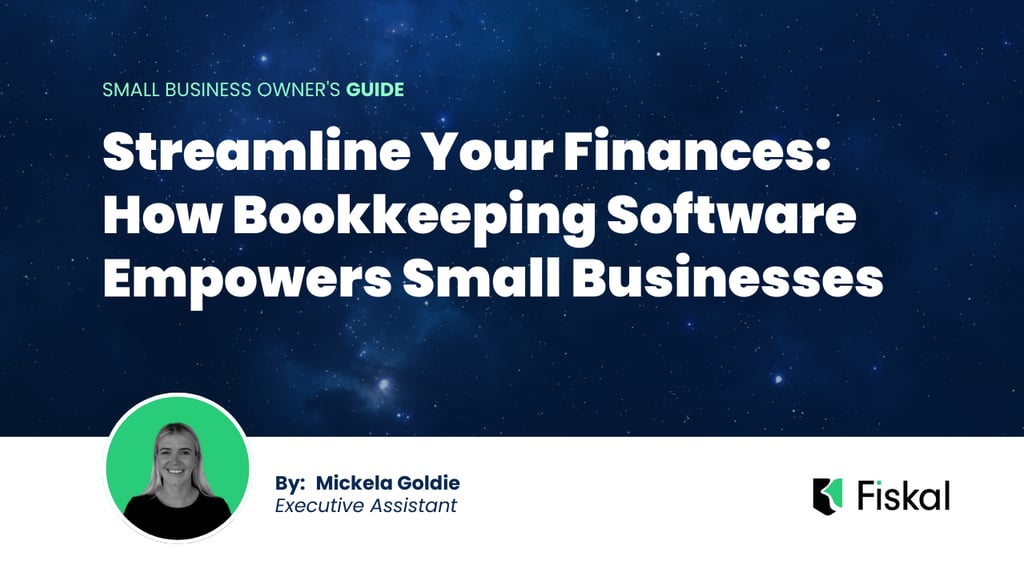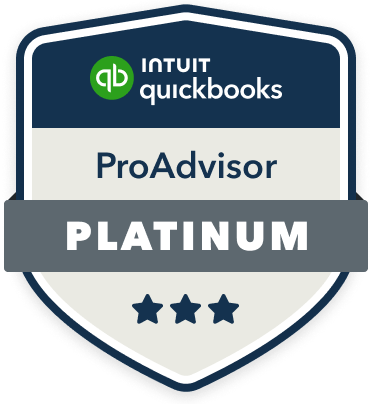Streamline Your Finances: How Bookkeeping Software Empowers Small Businesses
Are you ready to take the financial reins and steer your small business toward success? Enter the world of bookkeeping software, where empowerment meets efficiency.
SYSTEMS AND SOFTWARE


Are you ready to take the financial reins and steer your small business toward success? Enter the world of bookkeeping software, where empowerment meets efficiency. In today's fast-paced business landscape, managing finances is no small feat, especially for small businesses aiming to grow. This is where bookkeeping software steps in, offering a seamless solution to streamline your financial tasks, from tracking expenses and generating invoices to reconciling transactions. With the right bookkeeping software, you can bid adieu to the days of drowning in paperwork and data entry. Instead, fuel your business with real-time insights and actionable data, empowering you to make informed decisions that drive growth. In this article, we'll delve into the transformative power of bookkeeping software, unravelling the ways it revolutionizes the financial management landscape for small businesses. Say hello to simplified processes, increased accuracy, and more time to focus on scaling your entrepreneurial endeavours. It's time to embrace a smarter, more efficient approach to financial management – and watch your business thrive.
The importance of streamlined finances for small businesses
Small businesses are the lifeblood of the economy, driving innovation and creating opportunities. However, managing finances can be a daunting task, often leading to stress and inefficiencies. Streamlining financial processes is crucial for small businesses to stay competitive and agile in today's dynamic market. By embracing bookkeeping software, small business owners can gain control over their finances, paving the way for sustainable growth and success.
Efficient financial management not only ensures compliance and accuracy but also provides valuable insights that drive strategic decision-making. With streamlined finances, small businesses can allocate resources effectively, seize growth opportunities, and navigate challenges with confidence. Bookkeeping software serves as a catalyst for this transformation, offering a range of features designed to simplify and optimize financial tasks, empowering small business owners to focus on what truly matters – driving their businesses forward.
Understanding bookkeeping software
Bookkeeping software represents a digital solution for managing financial transactions, invoices, expenses, and other accounting tasks. It acts as a central hub for organizing and tracking financial data, eliminating the need for cumbersome manual processes. Through automation and advanced functionalities, bookkeeping software streamlines the entire financial management process, providing a clear and accurate view of a business's financial health.
Modern bookkeeping software is designed to be user-friendly, enabling small business owners and their teams to navigate the platform with ease. With intuitive interfaces and customizable features, bookkeeping software caters to the specific needs of small businesses, offering a seamless transition from traditional accounting methods to a more efficient and effective digital solution.
Benefits of using bookkeeping software
The adoption of bookkeeping software brings forth a myriad of benefits for small businesses. First and foremost, it eliminates the burden of manual data entry, reducing the risk of errors and ensuring the accuracy of financial records. Automation features enable tasks such as invoice generation, expense tracking, and bank reconciliation to be completed in a fraction of the time, freeing up valuable resources for strategic initiatives.
Moreover, bookkeeping software provides real-time visibility into a business's financial performance, allowing for informed decision-making based on up-to-date data. This proactive approach to financial management empowers small business owners to identify trends, monitor cash flow, and proactively address potential financial challenges. Additionally, many bookkeeping software solutions offer customizable reporting and analytics, enabling users to gain deeper insights into their financial metrics and track key performance indicators with ease.
Features to look for in bookkeeping software
When evaluating bookkeeping software options, it's essential to consider a range of features that align with the specific needs and goals of a small business. Cloud-based accessibility, for example, allows for seamless access to financial data from any location, promoting flexibility and collaboration within the organization. Integration capabilities with banking institutions and payment gateways streamline transaction processing, reducing manual effort and improving accuracy.
Scalability is another critical feature to consider, as small businesses evolve and expand over time. The ability of bookkeeping software to accommodate growth and additional users ensures that it remains a valuable asset throughout the business's journey. Furthermore, security measures, such as data encryption and multi-factor authentication, are essential to safeguard sensitive financial information, providing peace of mind for small business owners and their stakeholders.
Choosing the right bookkeeping software for your business
Selecting the right bookkeeping software entails a thorough assessment of the business's unique requirements and operational processes. It's crucial to consider factors such as the volume of transactions, the complexity of financial reporting needs, and the level of integration with existing business tools. A comprehensive understanding of the business's long-term goals and anticipated growth trajectory is also essential in choosing a scalable and adaptable bookkeeping solution.
Furthermore, seeking user feedback and conducting trials or demonstrations of various bookkeeping software options can provide valuable insights into the user experience and compatibility with the business's operations. As the market offers a diverse array of bookkeeping software solutions, ranging from basic entry-level platforms to sophisticated enterprise-grade systems, small business owners should prioritize selecting a solution that aligns with their current needs while offering the flexibility to accommodate future expansion.
How bookkeeping software empowers small businesses
The empowerment provided by bookkeeping software extends far beyond the realm of financial management. By automating repetitive tasks and centralizing financial data, small businesses can operate with increased efficiency and agility. This newfound efficiency allows for better resource allocation, enabling small business owners to direct their time and energy toward value-adding activities such as business development, customer engagement, and innovation.
Moreover, the actionable insights derived from bookkeeping software empower small business owners to make data-driven decisions that fuel growth and optimize performance. Whether it's identifying cost-saving opportunities, evaluating the profitability of products or services, or forecasting future financial trends, bookkeeping software serves as a strategic ally in steering small businesses toward sustainable success. The ability to access real-time financial information and performance metrics equips small business owners with the knowledge needed to seize opportunities and mitigate risks effectively.
Integrating bookkeeping software with other business tools
In the digital age, seamless integration between various business tools is essential for maximizing operational efficiency and productivity. Bookkeeping software, when integrated with other key systems such as customer relationship management (CRM) platforms, inventory management software, and payment processing solutions, forms a cohesive ecosystem that streamlines business processes and enhances cross-functional collaboration.
Integration eliminates silos of information, enabling data to flow seamlessly between different systems and departments. For example, the integration of bookkeeping software with a CRM platform allows for a holistic view of customer interactions and financial transactions, facilitating personalized customer engagement and accurate revenue tracking. This unified approach to data management fosters a more connected and informed decision-making environment, empowering small businesses to operate cohesively and adapt to evolving market dynamics.
Training and support for using bookkeeping software
While the adoption of bookkeeping software promises increased efficiency and accuracy, it's essential to invest in training and support to ensure that users can harness the full potential of the platform. Many bookkeeping software providers offer comprehensive training resources, including tutorials, webinars, and user guides, to familiarize users with the software's features and functionalities.
Additionally, seeking personalized support from the software provider or engaging with third-party consultants can further enhance the user experience and optimize the utilization of bookkeeping software. By equipping employees with the necessary skills and knowledge, small businesses can maximize the return on investment from their bookkeeping software, driving continued improvement in financial processes and overall business performance.
Bookkeeping software options for small businesses
The market for bookkeeping software is diverse, offering a wide array of options tailored to the specific needs and preferences of small businesses. From entry-level solutions designed for sole proprietors and startups to comprehensive platforms catering to growing enterprises, small business owners have the flexibility to choose a bookkeeping software that aligns with their operational scale and financial management requirements.
Popular bookkeeping software options include QuickBooks, Xero, FreshBooks, Wave, and Zoho Books, each offering unique features and pricing structures to accommodate different business models. It's important for small business owners to conduct thorough research, consider user reviews, and leverage trial periods to assess the suitability of various bookkeeping software options before making an informed decision.
Moreover, consulting with financial advisors or industry experts can provide valuable insights into selecting a bookkeeping software that aligns with the business's industry-specific needs and regulatory compliance requirements.
Conclusion
In the dynamic landscape of small business management, the role of bookkeeping software as a catalyst for financial empowerment cannot be overstated. By streamlining financial processes, providing real-time insights, and enabling informed decision-making, bookkeeping software equips small businesses with the tools they need to thrive and grow. The transformative impact of embracing digital solutions for financial management extends beyond mere efficiency – it lays the foundation for sustainable success, empowering small business owners to navigate challenges, seize opportunities, and chart a path to prosperity.
As small businesses continue to evolve and adapt to changing market dynamics, the strategic integration of bookkeeping software with other business tools and the investment in training and support are critical factors in maximizing the benefits of this digital transformation. With the right bookkeeping software in place, small business owners can focus their energy on innovation, customer engagement, and strategic growth initiatives, knowing that their financial foundation is fortified by advanced technology and actionable insights.
In the journey toward business success, embracing bookkeeping software isn't just about managing numbers – it's about embracing a mindset of empowerment, efficiency, and resilience. With the right tools at their disposal, small businesses can navigate the complexities of financial management with confidence, unlock their true potential, and carve a path toward sustained prosperity. It's time to streamline your finances, empower your business, and embark on a journey of growth and opportunity – all made possible by the transformative power of bookkeeping software.












